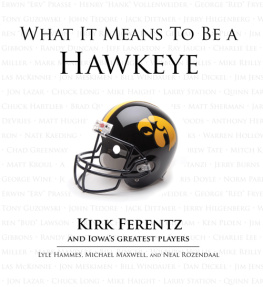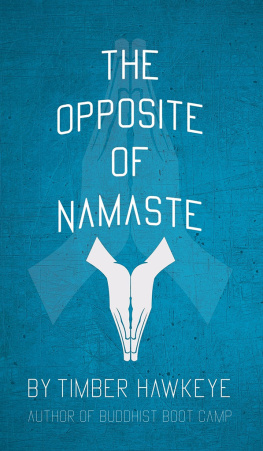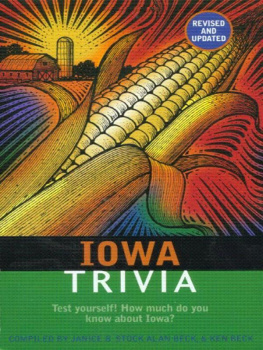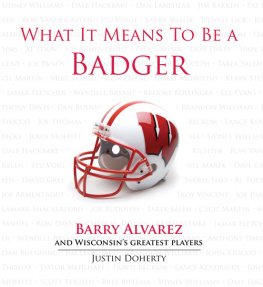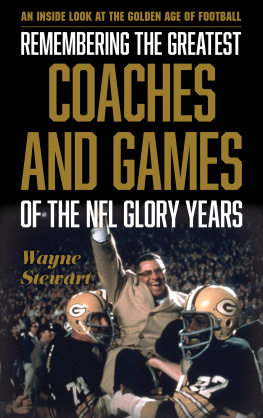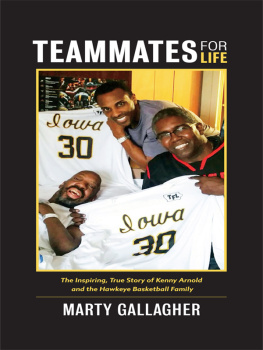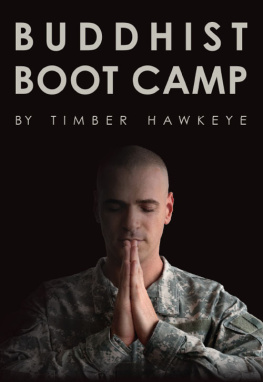Foreword by Kirk Ferentz
What It Means to Be a Hawkeye
F irst of all, it was pretty much by luck that I got here in the first place. Truth be known, I really wanted to stay at Pitt for another year. I was a grad assistant there in 1980, and I had a two-year agreement with my wife that when I went there, she was going to support me for two years. Grad assistants dont make any money, so, really, the master plan for us was to stay there for the fall of 81 and then go look for a job. The main reason I wanted to come to Iowa was to get some experience at interviewing so Id know what to do. But once I got here, I was completely overwhelmed with not only the place but also Coach [Hayden] Fry and all the people I met when I was here.
I think what separates this Iowa program from many others is the people. Thats what jumped out at me when I first arrived here in 1981. I came in with very low expectations. I knew nothing about the state, the university, or the program. I really didnt expect much. I was surprised at just how beautiful this town is. Above everything else, the one thing that really jumped out at me on the very first day was the quality of people here, not only the people I met that day professionallyCoach Fry, Bill Snyder, Barry Alvarez, the guys on campus I interviewed withbut also everybody I met around town. I still hear similar comments from recruits and parents all the time.
Probably the most influential person overall in my career was my high school coach, Joe Moore. I later worked for Joe at the University of Pittsburgh in 1980. Hes probably the guy who was as influential as anybody in terms of convincing Coach Fry to hire me. I learned as much about coaching football, people, and everything from Joe as anybody. He not only influenced me like that as a coach, but outside of my parents, Joe Moore invested more in me than anybody Id been with.
I give a lot of credit to Coach Fry, too. There probably wasnt another head coach in the country in Division I at that time who would have hired meprobably most D-I-AA schools wouldnt have, either. I really was inexperienced; I did not have the rsum suitable to the job. As much as anybody, Coach Fry helped shape my thoughts about how college football should be, the approach it should take. A lot of my thoughts about what weve done here the last 12 years go right back to my experience here in the 80s. And certainly, when I was here in the 80s, I watched what was being done and tried to analyze it. That was one of the most enjoyable periods of my life. Ultimately, it just came down to the people I was associated with on a day-to-day basis.
Ive been really lucky in my career. I have not worked for many people, but the people I have worked with have been top-shelf individuals. When I was in the NFL, I worked with Bill Belichick my first three years and with Ted Marchibroda the second three years. They were very different but both excellent people and excellent football coaches. Ive always worked for and with good people. The assistant coaches Ive worked with have been great as well, so Ive been really lucky.
I guess if I hadnt gotten the offer to come back to Iowa as the head coach in 1999, Id probably still be coaching in the National Football League. I enjoyed my job there, and at that time, it was never a goal of mine to go back to college coaching. It wasnt necessarily a goal of mine to be a head coach, either. This is probably the only college job I would have been interested in, just because my wife and I had a great comfort level with Iowa City in our nine years here. I didnt grow up here, but it just felt like home to us.
I know Bob Stoops was also a candidate for the job in 1999, but my dad once made the observation that it probably worked out the best for both parties, and I would agree. Bobs done a wonderful job at Oklahoma. While you almost get the feeling people sometimes portray it like Bob and I were divided over this, that was never the case. Bobs always been a good friend of mine. Ive had a great respect for him ever since I met him in 1981. Hes a tremendous coach. Hes obviously done a fantastic job there, and the nice thing is that it worked out very well for both parties.
When I came back in 1999, the major difference from 1981 was due to Coach Fry and the work he and the players had done. In 1999 there was a strong sense of tradition, and our facilities had come a long way. In 1981 there really was no recent tradition at that point, and while the facilities were in the process of being improved, they still needed attention. Also, there was no documented evidence of the ability to compete for championships when I came here in 81. Now its been proven teams can be very successful here. Players can play at the highest level and graduate from our program. And most important, its been proven they can be successful for life by getting an education thats going to serve them well and by being around people who are going to help serve them well for their future. Those things are very, very important.
I had three priorities when I took over in 1999. I was hoping we could put a staff together like we had in the 80s, because I enjoyed being a part of that staff so much. I wanted to put together a coaching staff of people who would be great teachers, good mentors, and just good people. The second phase was recruiting, because thats such a nonstop thing now in college football. And obviously the third thing was working with the players on our roster, trying to recruit them and guide them through the transition, because transitions are never easy.
Assistant coaches are everything, in my opinion. Looking through the staff in 81, there was nobody on that staff who had a knockout rsum, necessarily, before they came to the University of Iowaor maybe you could say there were reasons why these guys shouldnt or couldnt have been hired by Coach Fry, yet they were. I think Coach Fry had a real gift of seeing thingsunique thingsin people. I always thought that was interesting, his ability to pick people who ended up working pretty well as a team. That was a tremendous staff, and we had good continuity. Seven years later, there was not one change on that staff. There were no egos or jockeying for position on the staff. Everyones focus was on whats best for the team and carrying out the plan for that given day, that week, or that month. It was just a really good environment for everybody involved.
That was something I was hoping to re-create, and thats why I took so much time putting my staff together. It was the thing I was probably the most meticulous with. A lot of people had opinions about the pace I worked at, and there were a lot of people questioning the background of some of the people we hired. One that comes to mind was our offensive line coach, Joe Philbin, who we brought here from Harvard. He ended up doing a tremendous job with our line and went on to be the tight ends coach, line coach, and now serves as offensive coordinator of the Green Bay Packers. I think the most important thing was getting the right kind of people on board. If youre doing a good job there, then youre not getting coaches who only end up being here for two years before leaving for something different. Thats important, because, in my mind, continuity really makes it a better environment for our players. Everything we do should be geared toward providing a place where our players can really have an opportunity to learn and develop in all regards, not just as football players. Thats why stability on a staff is so important. Fortunately, I think weve put together a great staff. Weve had a couple guys come and go, but not many, and most of the guys who have left are currently head coaches in college or NFL assistants. Im just thrilled with how it turned out.
I can give you the exact countif you read the papers, they did a nice job of keeping scorewe were actually 218 our first 20 games. That was obviously a trying period. Behind the scenes, one thing coaches get to do is see the players and have a pulse on their attitudes. We also get to watch them practice, and we had seen improvement that wasnt showing up on the scoreboard. So, for the most part, we felt like things were moving in the right direction. But at some point players have to experience some success or you run the risk of losing them.
Next page
